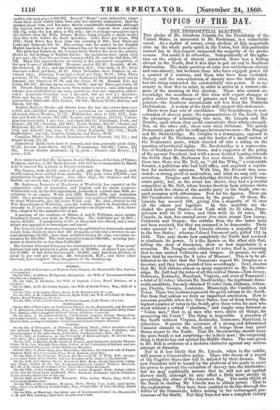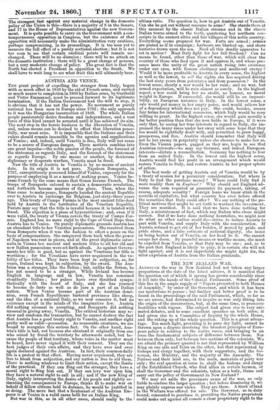TOPICS OF - THE DAY..
THE PRESIDENTIAL ELECTION. THE choice of Mr. Abraham Lincoln for the Presidency of the Ilnited States, in succession to Mr. Buchanan, is a remarkable event. As a matter of course, every election of this magnitude stirs up the whole party spirit in the Union, but this particular contest has in this.respect surpassed the majority of its prede- cessors. Nor could it be otherwise. Independently of the agita- tion on the subject of slavery extension, there was a feeling abroad in the North, that it was time to put 'an end to. Seuthern domination. The main: question at issue was not betiveen:slavery and non-slavery, but between those who have enjoyed gewer for a quarter of a century, and those who have been -ekoluded. Slavery and the non-extension of slavery were the battle cries, but the thing contended for substantially was power. It is ne- cessary to bear this in mind, in order to arrive at a correct esti- mate of the meaning of this. election. Those who cannot ac- knowledge the soundness of this view will expect changes of policy rather than changes of persons, and they will be disap- pointed—the Southern secessionists net less than the Northern abolitionists. A review of the facts will support this statement.
There were four seta of candidates. The Republicans, or non-
extension of slavery party, the representatives of the North, had the advantage of nominating two men, Mr. Lincoln apd Mr. Hamlin, upon whom they could concentrate their whole strength. But, on the other side, there were fatal divisions. The purely Democratic party split its suffrages between two men—Mr. Douglas and Mr. Breckinridge. Mr. Douglas is a demagogue, opposed to the policy of Mr. Buchanan, -and the leader of a small section of the Democratic party, which shunted off into a siding on the question of territorial rights. Mr. Breckinridge is a representa- tive of Southern Democratic views, and a supporter of the policy of the present President, but with a more decided leaning towards the South than Mr. Buchanan has ever shown. In addition to these two, there was Mi. Bell, an " old line Whig," a respectable Senator, a politician who had held office, and acquired a reputa- tion for' moderate opinions. With him, Mr. Everett was asso- ciated-7a strong proof of moderation, and what we may call con- servatism. Douglas and Breckinridge divided the purely Demo- cratic party, but, as the event has shown, they had a powerful competitor in Mr. Bell, whose known freedom from extreme views called forth the efforts of the middle party in the South, who re- gard secession with abhorrence. Now for the figures. There are 303 Presidential electors, chosen by the people. Of these, Mi. Lincoln has secured 169, giving him a majority of 35 over all the others put together. In this majority are in- cluded the great States—New York with its 35 votes, Penn- sylvania with its 27 votes, and Ohio with its 23 votes. Mr. Lincoln, in fact, has carried every free state except New Jersey, California and Oregon ; the returns from the two latter have not been received, but they are assumed to be democratic. Their Votes amount to 7; so that Lincoln obtains a majority of 162 in the free States; whereas Colonel Freemont only polled 114 in 1856. This only shows how completely the North had resolved to vindicate its power. It is the fignres on the other side that,
telling the story of dissension show us improbable is a
Secession.. Mr. Douglas only obtained 16 votes, that is, assumingthat he has carried California and Oregon. At present, we only know that he receives the 9 votes of Missouri. This is to be at- tributed to the fact that the Democrats regard Mr. Douglas as a deserter, and they have punished him accordingly. Next, observe that Mr. Bell obtains almost as many supporters as Mr. Breckin- ridge. Mr. Bell had the votes of all the central States—New Jersey, Delaware, Kentucky, Maryland, Virginia, and even of Tennessee ; a total of 57 votes ; whereas Mr. Breckinridge, the legitimate demo- cratic candidate, has only obtained 61 votes from Alabama; Arkan- sas, Florida, Georgia, Louisiana, Mississippi, the Carolinas, and Texas. These two sect_ ions represent the great schism in the gouth. But from that schism we draw an important conclusion. How is secession possible when five Slave States, four of them having the highest number of votes in the South, give those votes for men who stood without a settled " platform," and simply came forWard as " Union men," that is, as men who were, above all things, for preserving the Union ? The thing is impossible. A secession of the South without Virginia, Kentucky, Tennessee, Maryland, is ridiculous. •• It proves the existence of a strong and determined Unionist element in the South, and it brings those four great States nearer to the North. That Mr, Breckinridge should carry the pure South is not surprising—he is their man ; the surprising thing is that he has not carried the Middle States. The vote given to Mr: Bell is evidence 'of a decisive character against any serious attempt at disunion. Nor is it less likely that Mr, Lincoln, when in the saddle, will pursue a Conservative policy. Those who dream of a repeal of the Fugitive Slave-law will be deluded by their dreams. The new President will be bound by the platform of his party to exert his power to, prevent the extension of slavery into the territories ; but we may confidently assume - that he will not act against slavery itself, 'although he may affect a little more energy in preventing the abuse of the American flag. The main Object of the North in electing Mr. Lincoln was to obtain power. - That is the explanation. They have been enabled to do this through the follies of the Democrats, follies arising in the 'extravagant pre- tensions of the South. But they have tiot Won a complete victory The strongest. fact against any material- change in the domestic policy of the Union is this—there is a majority of 8 in the Senate, and 17 in the House of Representatives against the new Govern- ment. It is quite possible to carry on the Government with a con- temporaneous opposition in Congress, but the existence of that opposition will necessarily make the administration very cautious, perhaps compromising, in its proceedings. It is too soon yet to measure the full effect of a purely sectional election ; but it is not too soon to see that certain cardinal points will remain un- changed. There will be no disunion; there will be no attack on the domestic institution ; there will be a_6reat change of persons, but a very moderate change of policy. The great fact is that the North has elected a President in opposition to the South. We shall have to wait long to see what fruit this will ultimately bear.



























 Previous page
Previous page